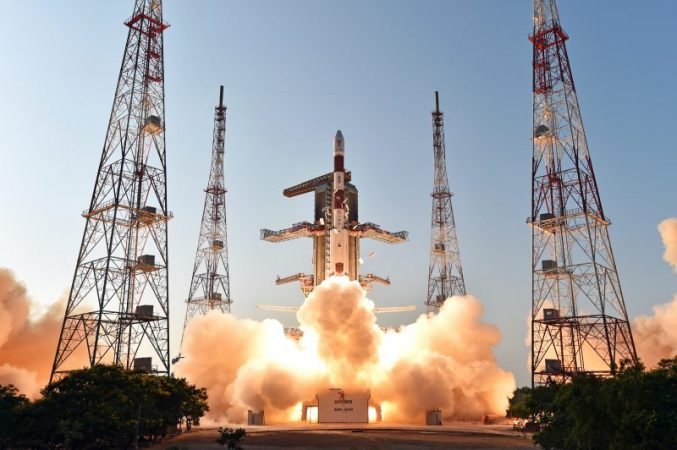India-Nigeria: Space Exploration For Diplomatic Ties

Nigeria, which is Africa’s most populated country with a very young population demographic, is a growing economy and is seen as a country with a lot of potential and opportunities. Even though the country is quite a stable democracy with an elected government along with a fairly good economic growth rate, foreign investment and outside assistance in its development activities have been quite limited, which has created a roadblock in process of growth. This country recently came into our highlights, when the Government of India signed an MoU with the government of Nigeria in Outer Space Exploration. This is a huge and positive step in helping the developing country in Africa to become a self-capable nation and improve itself holistically in all spheres.
The details of the treaty
The treaty, which was earlier signed by the Chairman of ISRO, Dr K. Sivan, was later signed by Dr Francis Chizea Director General of National Space Research & Development Agency (NASRDA), Nigeria on the 13th of August. The MoU contains details about the areas and levels of collaboration between the two countries and the kind of assistance that will be provided by the Indian side to Nigeria. Mentions about association and partnerships in the domains of Space science, planetary explorations, ground stations, and joint exercises in Space R&D have been witnessed.
The highlight of the MoU is the collaborative effort in building micro and mini satellites which will help the government of Nigeria in effectively carrying out its administrative activities. Moreover, a detailed idea about the various academic exchange programmes planned as well as conferences and symposiums were also mentioned in the Memorandum. ISRO has committed itself to help provide capacity building infrastructure and training facilities along with important technological and scientific information transfers for the benefit of the Nigerian Space Organisation. This, according to the press notification released by the Ministry of External Affairs, will help Nigeria in developing and strengthening communication, remote sensing and navigation in critical sectors of forestry, environment, agriculture, mining, connectivity and watershed development.
India-Nigeria Relations
India has always been very supportive of and helpful to countries trying to develop and improve their economic and social status by investing in vast multi-sectoral projects in those countries. Nigeria is one such country and this is proven by the fact that India’s largest trading partner in Africa is Nigeria. Also, with India being Nigeria’s biggest trading partner for a really long time now, this relationship is seen to be maintained quite consistently. Indian development specialists have been working in Nigeria and have helped the country in various capacities.
Nigerian participation in the ITEC courses conducted in India has been consistent since the past 12 years with young students being selected for courses in the fields of Remote Sensing, GIS and Geoinformatics. To further this space partnership, both the countries also agreed to sign a subsidiary MoU under ISRO. This has been signed between the New Space India Limited and the Nigeria Erosion and Watershed Management Project to work on the uses of geospatial technologies and improving agricultural prospects in Nigeria.
Why is socio-economic development important in Nigeria
Nigeria is a crucial country in Africa because of its geographical presence in West Africa and it’s an abundance of mineral resources. It also has a large labour force available to work at a very low wage rate and thus is capable of attracting MNCs and foreign capital. But the only disadvantage that the county faces is its poor performance in the Human Development Index as a result of lack of quality education. This also, in turn, has resulted in a scarcity of skilled educated workers hence, seriously depriving the country of business and economic activity to boost growth. Another thing that deters foreign companies from investing here is the serious lack of security measures and very high crime rates. Nevertheless, the country is filled with huge potential and is constantly seeking foreign investment to help itself come out of the deep socio-economic problems of poverty, crimes and unemployment it faces. Moreover, some countries like China, Russia and in the Middle East take advantage of these countries because of their poor bargaining power and have exploited them like colonies, and leaving them worse off than before. Now, with more and more countries in Africa in debt to China, there is a huge possibility of them being taken over by China and expanding of Chinese vested interests in these areas of strategic importance. Hence, to uphold the fundamental principles of sovereignty and self-reliance, these countries need the assistance of democratic powers like India and the United States to stay out of the traps created by others and maintain their independence.

Importance of space exploration and diplomacy
The role of space exploration has been seen since the times of the Cold war. It is an accepted fact in the diplomatic circles that cooperation in space exploration plays a pivotal role in building bilateral and multilateral relationships between countries. They necessarily open door to new opportunities in collectively addressing global challenges such as Climate change and also helps in the process of trust-building, the requirement of which is very important in any strong diplomatic relationship. The benefits of space coordination transcend into various segments such as health, geography, scientific research, environment, transportation and computer technology. It helps with the exchange of technology by developed countries to those countries who need their assistance in building their own space exploration infrastructure. Satellite launching as a shared experience can be nurtured helping in increasing efficiency and saving costs for the same. It also provides countries with innovative ways to further their foreign relation objectives through scientific endeavours. This soft power of scientific programmes is an astute way of engaging and building cooperation with countries having tactical importance in the long run.


















